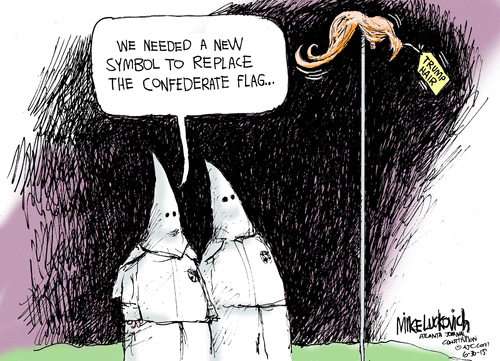
by Paul Abrams
Justice Antonin Scalia's dissent in
Obergefell v Hodges
-- the case that declared that denying same-sex couples marriage
licenses violated the equal protection and due process clauses of the
Fourteenth Amendment -- is best known for its tantrums and, as usual for
the politician Scalia is rather than the jurist he is supposed to be,
its hypocrisy.
Missed in Scalia's childish histrionics was his
so-called 'originalist' approach for interpreting the Constitution
(when it suits him, that is -- those who voted on the Second Amendment
could not possibly have been thinking about semi-automatic assault
weapons or 25 bullet magazines, but Scalia holds that those are
protected).
In
Obergefell, Scalia asserts that he knows
that the people who voted to approve the Fourteenth Amendment in 1868
were not thinking about same-sex marriage when they voted, and,
therefore, the original intent of that Amendment prevents Scalia from
finding a right to same-sex marriage in its guarantee of equal
protection under the laws.
That same approach, however, would make
Justice Clarence Thomas's interracial marriage illegal, and subject to
criminal prosecution in Virginia, the Thomas's state of residence. As
assuredly as voters in 1868 were not thinking about gay marriage when
they voted for the Amendment, they certainly were not approving it to
enable interracial marriages.
Interracial marriage,
"miscegenation," was not only impermissible in Virginia, it was a
criminal offense subject to time in jail. Citing the equal protection
clause of the Fourteenth Amendment, the Supreme Court overturned the
Virginia and other state statutes in the poetically-named case,
Loving v. Virginia, in 1967.
According
to Justice Scalia's reasoning, the people voting on the Fourteenth
Amendment in 1868 did not contemplate interracial marriage as what they
were protecting by passing it. Hence, Scalia would have to say that
Loving was wrongly decided.
That would make Scalia's wingnut buddy, Justice Clarence Thomas and his wife Ginny, subject to imprisonment in Virginia.










![GOP presiential candidate Donald Trump on 'The Late Show' during an October 2013 appearance. [CBS]](http://www.rawstory.com/wp-content/uploads/2015/06/Donald-Trump2-478x257.jpg)







 by Paul Abrams
by Paul Abrams

